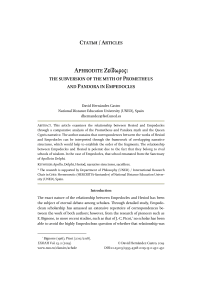Aphrodite : the subversion of the myth of Prometheus and Pandora in Empedocles
Автор: Hernndez Castro David
Журнал: Schole. Философское антиковедение и классическая традиция @classics-nsu-schole
Рубрика: Статьи
Статья в выпуске: 2 т.13, 2019 года.
Бесплатный доступ
This article examines the relationship between Hesiod and Empedocles through a comparative analysis of the Prometheus and Pandora myth and the Queen Cypris narrative. The author sustains that correspondences between the works of Hesiod and Empedocles can be interpreted through the framework of overlapping narrative structures, which would help to establish the order of the fragments. The relationship between Empedocles and Hesiod is polemic due to the fact that they belong to rival schools of wisdom. In the case of Empedocles, that school emanated from the Sanctuary of Apollo in Delphi.
Apollo, delphi, hesiod, narrative structures, sacrifices
Короткий адрес: https://sciup.org/147215822
IDR: 147215822 | DOI: 10.25205/1995-4328-2019-13-2-430-450
Список литературы Aphrodite : the subversion of the myth of Prometheus and Pandora in Empedocles
- https://nsu.ru/classics/schole/13/13-2-castro.pdf
- Bignone, E. (1916) Empedocle. Torino.
- Bollack, J. (2003) Empédocle. Les purifications. Un Project de paix universalle. Paris.
- Burnet, J. (1908) Early Greek Philosophy, 2nd ed. London.
- Calame, C. (2009) Poetic and Performative Memory in Ancient Greece, Heroic Reference and Ritual Gestures in Time and Space, Hellenic Studies Series 18. Washington, DC.
- Cardullo, R. L. (2011) "Empedocle πυθαγορικός. Un'«invenzione» neoplatonica?", L. Palumbo, ed. Logon didonai. Studi in onore di G. Casertano. Napoli, 817-839.
- Casertano, G. (2009) I presocratici. Roma.
- Cornford, F. M. (1939) Plato and Parmenides. Parmenides’ Way of Truth and Plato’s Parmenides. London.
- Couloubaritsis, L. (2008) La pensé de Parménide. Bruxelles.
- Detienne, M. (2000) Comparer l’incomparable. Paris.
- Gallavotti, C. (1975) Empedocle. Poema físico e lustrale. Milano.
- Garani, M. (2007) Empedocles Redivivus: Poetry and Analogy in Lucretius. New York/London.
- Gemelli Marciano, M. L. (1990) Le metamorfosi della tradizione. Mutamenti di significato e neologismi nel Peri Physeos di Empedocle. Bari.
- Gemelli Marciano, M. L. (2005) "Empedocles' Zoogony and Embryology", A. L. Pierris, ed. The Empedoclean Κόσμος: Structure, Process and the Question of Cyclicity. Patras, 373-404.
- Guthrie, W. K. C. (1965) A History of Greek Philosophy, vol. II: The Presocratic Tradition from Parmenides to Democritus. Cambridge.
- Hershbell, J. P. (1970) "Hesiod and Empedocles", The Classical Journal 65, 145-161.
- Hershbell, J. P. (1971) "Plutarch as a Source for Empedocles Re-Examined", The American Journal of Philology 92, 156-184.
- Inwood, B. (2001) The Poem of Empedocles. Toronto/Buffalo/London.
- Jaeger, W. (1947) The Theology of the Early Greek Philosophers: The Gifford Lectures, 1936. Oxford.
- Kingsley, P. (1995) Ancient Philosophy, Mystery, and Magic: Empedocles and Pythagorean Tradition. Oxford.
- Kirk, G. S.; Raven, J. E. (1957) The Presocratics Philosophers. A Critical History with a Selection of Texts. Cambridge.
- Mackenzie, T. (2016) "The Contents of Empedocles' Poem: A New Argument for the Single-Poem Hypothesis", Zeitschrift für Papyrologie und Epigraphik 200, 25-32.
- Mazzarino, S. (1947) Fra Oriente e Occidente: ricerche di storia greca arcaica. Firenze.
- Most, G. (2012) "ἄλλος δ' έξ ἄλλου δέχεται. Presocratic Philosophy and Traditional Greek Epic", A. Bierl, R. Lämmle and K. Wesselmann, eds. Literatur und Religion, 1, Wege zu einer mythisch-rituellen Poetik bei den Griechen. Berlin/New York, 271-302.
- Osborne, C. (1987) "Empedocles Recycled", The Classical Quarterly 37, 24-50.
- Picot, J.-C. (2008) "Empédocle pouvait-il faire de la lune le séjour des Bienheureux?", Organon 37(40), 9-37.
- Picot, J.-C. (2012/3) "Les dieux du fr. 128 d'Empédocle et le mythe des races", Revue de métaphysique et de morale 75, 339-356.
- Picot, J.-C. (2017/2018) "Penser le Bien et le Mal avec Empédocle", χώρα, REAM, 15-16, 25, 381-414.
- Picot, J.-C.; Berg, W. (2015) "Lions and promoi: Final Phase of Exile for Empedocles' daimones", Phronesis 60, 380-409.
- Picot, J.-C.; Berg, W. (2018) "Apollo, Eros, and Epic Allusions in Empedocles, Frr. 134 and 29 DK", American Journal of Philology 139, 365-396.
- Primavesi, O. (2006) "Apollo and Other Gods in Empedocles", M. M. Sassi, ed. La costruzione del discorso filosofico nell'età dei Presocratici. Pisa, 51-77.
- Primavesi, O. (2008) "Empedocles: Physical and Mythical Divinity", P. Curd and D. W. Graham, ed. The Oxford Handbook of Presocratic Philosophy. Ox-ford, 250-283.
- Primavesi, O. (2011) "Empedokles. Texte und Übersetzungen", J. Mansfeld; O. Primavesi, hrsgs. Die Vorsokratiker: Griechisch/Deutsch. Stuttgart, 392-563.
- Redfield, J. (2012) "Animal sacrifice in comedy. An alternative point of view", C. A. Faraone and F. S. Naiden, eds. Greek and Roman Animal Sacrifice. Ancient Victims, Modern Observes. Cambridge, 167-179.
- Rangos, S. (2012) "Empedocles on Divine Nature", Revue de métaphysique et de morale 75, 315-338.
- Russell, D. A. (1973) Plutarch. London.
- Santaniello, C. (2012) "Θεός, Δαίμων, Φρὴν Ἱερή: Empedocles and the Divine", Revue de métaphysique et de morale 75, 301-313.
- Sedley, D. (1998) Lucretius and the Transformation of Greek Wisdom. Cambridge.
- Sedley, D. (2007) Creationism and Its Critics in Antiquity. Berkeley/Los Angeles/London.
- Solmsen, F. (1980) "Empedocles' Hymn to Apollo", Phronesis 25, 219-227.
- Trépanier, S. (2004) Empedocles. An Interpretation. New York/London.
- Valverde Sánchez, M. (2003a) "Amor y matrimonio en el Erótico de Plutarco", J. M. Nieto Ibáñez, ed. Lógos hellenikós: Homenaje al profesor Gaspar Moracho Gayo. Vol. 1. León, 441-454.
- Valverde Sánchez, M. (2003b) "Introducción", M. Valverde Sánchez, H. Rodríguez Somolinos and C. Alcalde Martín, eds. Plutarco: Obras morales y de costumbres (Moralia) X. Madrid, 8-40.
- Van Noorden, H. (2014) Playing Hesiod The "Myth of the Races" in Classical Antiquity. Cambridge.
- Vernant, J.-P. (1974) "Mythe de Prométhée chez Hésiode", J.-P. Vernant, Mythe et societé en Grèce ancienne. Paris, 177-194.
- Wersinger, A.-G. (2004) "La «fête criminelle» (Empédocle, Perséphone et les Charites)", in: M. Mazoyer, J. Pérez-Rey, F. Malbran-Labat, R. Lebrun, eds. La Fête, la rencontre des dieux et des hommes, (Actes du Colloque International). Paris, 109-132.
- Wright, M. R. (1981) Empedocles: The Extant Fragments, New Haven/London.
- Zuntz, G, (1971) Persephone. Three Essays on Religion and Thought in Magna Graecia. Oxford.


